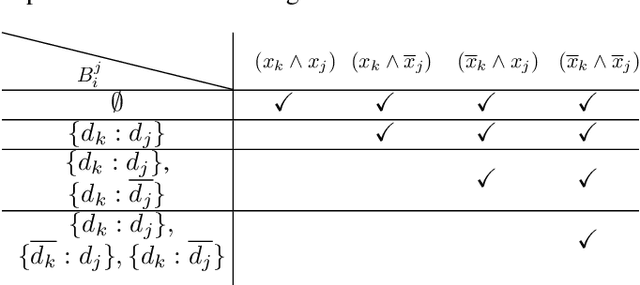Georgios Papasotiropoulos
Proportionality in Thumbs Up and Down Voting
Mar 03, 2025Abstract:Consider the decision-making setting where agents elect a panel by expressing both positive and negative preferences. Prominently, in constitutional AI, citizens democratically select a slate of ethical preferences on which a foundation model is to be trained. There, in practice, agents may both approve and disapprove of different ethical principles. Proportionality has been well-studied in computational social choice for approval ballots, but its meaning remains unclear when negative sentiments are also considered. In this work, we propose two conceptually distinct approaches to interpret proportionality in the presence of up and down votes. The first approach treats the satisfaction from electing candidates and the impact of vetoing them as comparable, leading to combined proportionality guarantees. The second approach considers veto power separately, introducing guarantees distinct from traditional proportionality. We formalize axioms for each perspective and examine their satisfiability by suitable adaptations of Phragm\'en's rule, Proportional Approval Voting rule and the Method of Equal Shares.
Proportional Selection in Networks
Feb 05, 2025



Abstract:We address the problem of selecting $k$ representative nodes from a network, aiming to achieve two objectives: identifying the most influential nodes and ensuring the selection proportionally reflects the network's diversity. We propose two approaches to accomplish this, analyze them theoretically, and demonstrate their effectiveness through a series of experiments.
The Cost Perspective of Liquid Democracy: Feasibility and Control
Feb 04, 2025
Abstract:We examine an approval-based model of Liquid Democracy with a budget constraint on voting and delegating costs, aiming to centrally select casting voters ensuring complete representation of the electorate. From a computational complexity perspective, we focus on minimizing overall costs, maintaining short delegation paths, and preventing excessive concentration of voting power. Furthermore, we explore computational aspects of strategic control, specifically, whether external agents can change election components to influence the voting power of certain voters.
As Time Goes By: Adding a Temporal Dimension Towards Resolving Delegations in Liquid Democracy
Jul 24, 2023Abstract:In recent years, the study of various models and questions related to Liquid Democracy has been of growing interest among the community of Computational Social Choice. A concern that has been raised, is that current academic literature focuses solely on static inputs, concealing a key characteristic of Liquid Democracy: the right for a voter to change her mind as time goes by, regarding her options of whether to vote herself or delegate her vote to other participants, till the final voting deadline. In real life, a period of extended deliberation preceding the election-day motivates voters to adapt their behaviour over time, either based on observations of the remaining electorate or on information acquired for the topic at hand. By adding a temporal dimension to Liquid Democracy, such adaptations can increase the number of possible delegation paths and reduce the loss of votes due to delegation cycles or delegating paths towards abstaining agents, ultimately enhancing participation. Our work takes a first step to integrate a time horizon into decision-making problems in Liquid Democracy systems. Our approach, via a computational complexity analysis, exploits concepts and tools from temporal graph theory which turn out to be convenient for our framework.
Computational Aspects of Conditional Minisum Approval Voting in Elections with Interdependent Issues
Feb 03, 2022

Abstract:Approval voting provides a simple, practical framework for multi-issue elections, and the most representative example among such election rules is the classic Minisum approval voting rule. We consider a generalization of Minisum, introduced by the work of Barrot and Lang [2016], referred to as Conditional Minisum, where voters are also allowed to express dependencies between issues. The price we have to pay when we move to this higher level of expressiveness is that we end up with a computationally hard rule. Motivated by this, we focus on the computational aspects of Conditional Minisum, where progress has been rather scarce so far. We identify restrictions that concern the voters' dependencies and the value of an optimal solution, under which we provide the first multiplicative approximation algorithms for the problem. At the same time, by additionally requiring certain structural properties for the union of dependencies cast by the whole electorate, we obtain optimal efficient algorithms for well-motivated special cases. Overall, our work provides a better understanding on the complexity implications introduced by conditional voting.
* corrected version of the following IJCAI-20 publication: Evangelos Markakis and Georgios Papasotiropoulos. Computational aspects of conditional minisum approval voting in elections with interdependent issues. In Proceedings of the 22nd International Joint Conference on Artificial Intelligence (IJCAI-20), pages 304-310, 2020. (link: https://www.ijcai.org/Proceedings/2020/0043.pdf)
 Add to Chrome
Add to Chrome Add to Firefox
Add to Firefox Add to Edge
Add to Edge